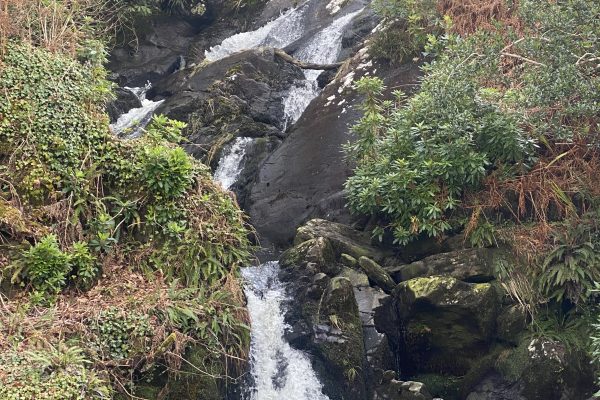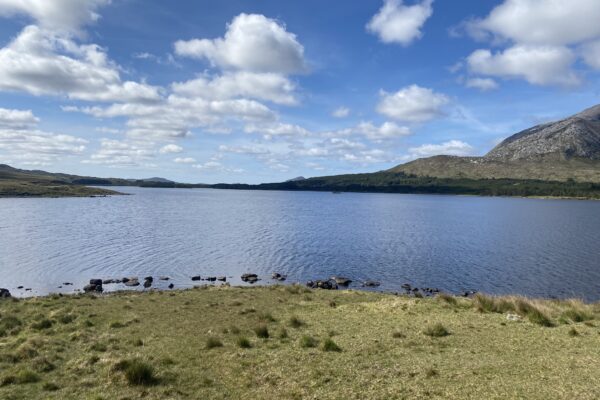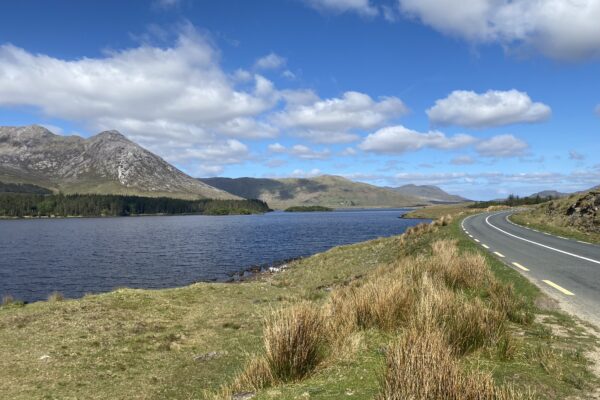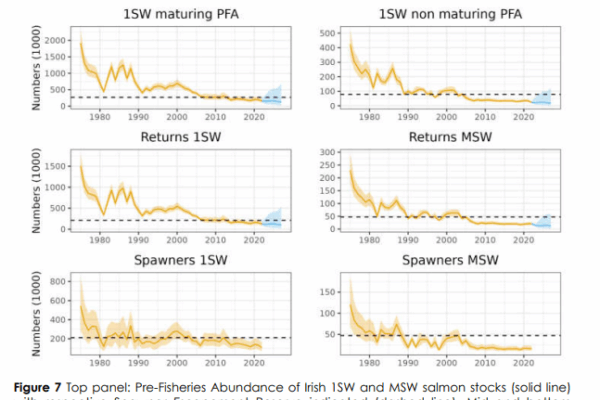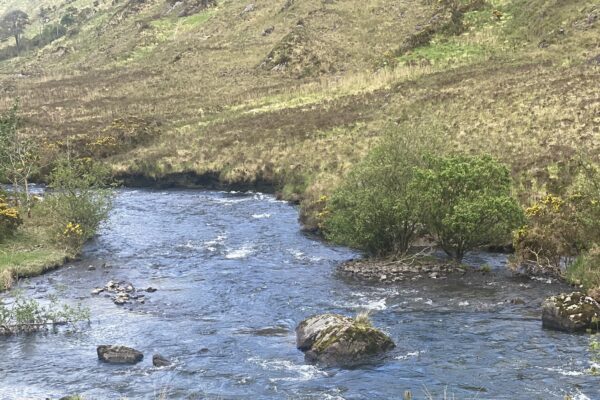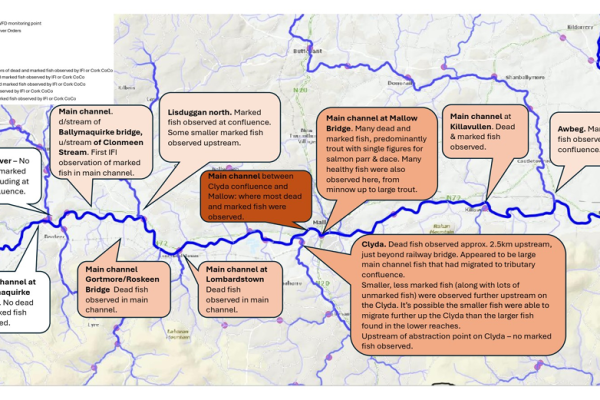-
Salmon Watch Ireland Newsletter Issue Number 28 – 10 January 2026
Irish Salmon at a Crossroads: What the Latest Science Is Telling Us A series of recent scientific reports paint a clear and concerning picture for Atlantic salmon in Ireland. Taken together, long-term monitoring in rivers and new research on marine ecosystems show that salmon declines are being driven by linked pressures across the entire life cycle, from reduced ocean productivity to chronically low spawning escapement in freshwater.
Continue reading -
Newsletter Number 26 – Changing Waters – Why salmon need full system protection more than ever.
We are publishing this newsletter as a result of suggestions that some individuals argue that catch-and-release does little to help revive wild salmon, claiming that broader environmental pressures make angling practices irrelevant. We fundamentally disagree. In rivers that are below their Conservation Limit, every surviving adult is vital to the future of the stock. When marine survival is at historic lows and multiple pressures—warming waters, predation, habitat loss,aquaculture impacts, and bycatch—are already removing fish at every stage of their life cycle, the one thing we can control immediately is exploitation. Catch-and-release is not a cure-all, but it is a crucial, measurable way to ensure more spawners reach the gravel. It is an act of responsibility, restraint, and stewardship—and when stocks are depleted, releasing salmon is one of the most direct contributions an individual can make to the recovery of the species.
Continue reading -
Gearhies Bantry Bay Submission – Salmon Watch Ireland
Salmon Watch Ireland (SWI) submits that aquaculture licences T05/122 and T05/122A cannot lawfully be renewed. The application by Murphy’s Irish Sea Food fails to meet fundamental requirements under the Habitats Directive, Water Framework Directive (WFD), EIA Directive, and the Nature Restoration Law, and does not remove the scientific doubt necessary to permit authorisation. Legal Compliance Not Achieved • Article 6(3) of the Habitats Directive requires no reasonable scientific doubt of no adverse effects on SACs—this threshold is not met. • Article 6(4) cannot apply: no imperative reasons of overriding public interest (IROPI) exist. • Under the WFD, any deterioration of High-Status waters is unlawful outside narrow exceptions that are not invoked here. • Irish case law (Connelly, Kelly, SWI v ALAB) confirms that consent cannot be granted where scientific uncertainty persists. Full Text Here
Continue reading -
Press Release Salmon Watch Ireland – New Conservation Measures
Salmon Watch Ireland Strongly Welcomes 2026 Salmon Protection Measures and Calls for a Fair Transition Away from All Commercial Exploitation 22 November 2025 Atlantic salmon stocks in Ireland have reached critically low levels, and decisive intervention is now essential to ensure that as many fish as possible survive to reach their spawning grounds in the years ahead. The species is caught in a rapidly accelerating decline, with many rivers falling far short of the numbers needed to sustain healthy future populations. Without urgent and meaningful conservation measures, we risk pushing Atlantic salmon toward irreversible collapse. Accordingly, Salmon Watch Ireland welcomes the publication of the 2026 Wild Salmon and Sea Trout Tagging Scheme Regulations and associated Information Note, commending the Department of Climate, Energy and the Environment, Inland Fisheries Ireland and the Technical Expert Group on Salmon (TEGOS) for taking decisive, science-driven action to protect Ireland’s diminishing wild salmon stocks. Salmon Watch Ireland describes the new framework as one of the most encouraging conservation steps in over a decade, signalling a genuine commitment to reversing long-term decline. A Clear, Science-Led Approach to Salmon Conservation The 2026 regulations introduce some of the strongest salmon conservation measures in recent years, including: Mandatory Catch & Release from 1 January to 31 May, protecting vulnerable spring salmon Harvest only from 1 June to 31 August on rivers with a proven surplus. A seasonal bag limit of three salmon for recreational anglers on rivers with a harvestable surplus. Improved conservation limits (CL) thresholds, aligned with best conservation international practice Expanded protection for multi-sea-winter (MSW) salmon. However, the organisation encourages the Department to keep the situation under review and consider whether a future maximum size limit could help protect the largest, most important spawning fish. Closure to exploitation in September. Closure of significant number of commercial salmon fisheries “These are robust and welcome reforms,” said John Murphy, Salmon Watch Ireland spokesperson. “The Department has shown leadership, transparency, and a real understanding of the pressures facing this iconic species.” Commercial Fisheries: Time for a Fair, Supportive Transition Salmon Watch Ireland notes that a small number of draft-net commercial fisheries, including the Laune Estuary and Cork Harbour, remain technically capable of operating in 2026 based on available stocks. We have sought clarification on the status of one further fishery. This organisation fully respects the heritage and rights of these fishers. However, given sustained declines in national and international salmon returns, Salmon Watch Ireland believes the next constructive step is: A closure of all remaining commercial fisheries Supported by a fair, well-funded compensation and transition scheme This would provide certainty for fishers while aligning Ireland with modern international conservation standards. “Commercial fishers have operated legally. They deserve respect — and proper compensation — as Ireland moves toward a fully conservation-based salmon policy.” A Shared Mission to Restore Wild Salmon Salmon Watch Ireland applauds the direction of travel in the 2026 regulations and urges continued national action on: Water quality improvements Habitat restoration and barrier removal Enhanced enforcement resourcing Addressing climate and marine survival pressures Tackling aquaculture-related impacts “This is the most hopeful moment for salmon conservation in many years,” the spokesperson concluded. “With continued collaboration among stakeholders — and a fair, well-designed transition away from commercial exploitation — Ireland can restore its wild salmon for future generations.”
Continue reading -
Salmon Tagging Regulations – Newsletter Number 25 – November 25-2025
Across Ireland, Atlantic salmon stocks have reached alarmingly low levels, a situation clearly reflected in Inland Fisheries Ireland’s 2026 scientific assessments. Many rivers now fall below 65% of their Conservation Limit (CL) resulting in unprecedented numbers of rivers being designated Catch & Release only or fully closed under the 2026 Wild Salmon and Sea Trout Tagging Scheme Regulations. Our latest newsletter examines the legislation and calls for support.
Continue reading -
Newsletter Re: Exploitation – Number 24
We are pleased to announce the release of our latest Wild Salmon Conservation Newsletter, which presents the initial key themes, priorities, and actions identified through public feedback on how best to manage exploitation and implement effective policies to increase wild smolt production and improve adult salmon returns. The newsletter highlights the issues that matter most to anglers, conservationists, and local communities—including enforcement, habitat restoration, marine survival challenges, aquaculture concerns, and the urgent need for coordinated action across agencies. Your input has been invaluable, and this summary reflects the collective voice of those committed to protecting Ireland’s wild salmon. We encourage you to read it, share it, and continue engaging as we move forward with stronger advocacy and evidence-based policy proposals. If you have any comments or wish to contribute further, we’d be delighted to hear from you. The survey is still live and you are welcome to contribute if you have not done so. Thank you for your continued support and dedication to safeguarding our wild salmon. Wild Salmon Conservation Newsletter Number 24
Continue reading -
Conference Proceedings – Salmon Watch Ireland, Athlone 11 October 2025
This special conference edition — “Protecting Wild Salmon: Science, Stewardship, and Accountability” — captures the key discussions and outcomes from our 2025 Athlone Conference. Inside you’ll find: Science and Survival: Dr. Elvira de Eyto on seven decades of data from Burrishoole, and Dr. Paddy Gargan confirming the clear link between sea lice and salmon mortality. Grassroots Action: Maura Brennan’s Nore Vision project showing the power of community-led stewardship. Policy and Law: Emma Armshaw (SWAN) on the incompatibility of open-net salmon farming with EU clean-water directives. A Call to Action: From pollution reporting to citizen science — discover how you can make a difference. Thank you for your continued support in protecting Ireland’s wild salmon. Newsletter Number 22 Final
Continue reading -
Deenish Island – ALAB Determination – Letter to Minister Heydon DAFM
Dear Minister Heyden, On behalf of Salmon Watch Ireland, I write to express our profound concern at the recent determination of the Aquaculture Licences Appeals Board (ALAB). The decision, in our considered view, undermines the protection of Ireland’s wild Atlantic salmon and sea trout and fails to uphold the standards required under Irish and European law. The determination highlights a deeply troubling reality: operators, despite having breached and continuing to breach the terms and conditions of their licences, appear able to operate without sanction. This sets a dangerous precedent, erodes public confidence in the regulatory process, and calls into question the integrity of environmental governance. We are further concerned that: The impacts on wild salmon and sea trout populations, particularly within the Waterville system and other iconic fisheries, were not adequately assessed. The implications for angling tourism — a vital contributor to rural economies — were ignored. Key inspections were delayed, raising doubts as to whether site-specific environmental risks were properly evaluated. The recent transfer of salmon other than smolts, currently under investigation by your Department, raises serious compliance and biosecurity issues that underscore the need for stricter enforcement. Minister, you will recall that in 2019 your Department issued an enforcement order in response to similar breaches, ensuring that aquaculture operators were held to account. The present circumstances demand no less. A comparable order is urgently required to prevent further non-compliance and ecological damage. We must highlight the continuing reliance on Section 19A(4) of the Fisheries (Amendment) Act 1997, which permits aquaculture operators to continue operating under their original licence terms and conditions while renewals have been lodged. In its Deenish determination (AP1/2019), ALAB accepted that condition 2(e) of the licence had been blatantly breached. Harvesting almost four times the legal limit is not a technicality; it is a wholesale disregard for the terms of the licence. Yet ALAB concluded that revoking the statutory entitlement would be “disproportionate.” MOWI has previously sought to amend the terms and conditions of its licence; however, this request was refused by the State. Notwithstanding this refusal, the company has continued to operate in breach of its extant licence and remains in contravention of the legally binding terms and conditions governing its operations. The consequences of this are grave. Section 19A(4) can now be interpreted as a shield that allows operators who are in breach of their licences to continue farming under the protection of the "law", even while those breaches remain unpunished. No fines, no suspensions, no meaningful sanction. The State’s hands are tied, not because it lacks evidence, but because the appeal process itself provides cover for non-compliance. This decision shatters the authority of the Minister and the Department to regulate aquaculture. It tells every operator that licence conditions are little more than suggestions, that breaches can be bargained away, and that even blatant non-compliance carries no real consequence. It empowers those already inclined to disregard the law, while leaving local communities and fragile marine environments unprotected and at risk. The integrity of Ireland’s regulatory regime depends on the principle that a licence is binding and enforceable. But Section 19A(4), as it currently stands, makes a mockery of that principle. Until this provision is repealed, aquaculture operators will continue to enjoy a legal loophole that lets them operate outside the law, immune from sanction, and secure in the knowledge that environmental safeguards can be breached without consequence. The Government has previously undertaken to delete Section 19A(4). That promise must now be honoured. Every day this provision remains in force, the credibility of aquaculture regulation is eroded, public trust is lost, and Ireland’s environmental protections are sacrificed to a system that rewards non-compliance. This undermines public confidence in the regulatory system and creates the perception that aquaculture operators can operate above the law. The provision fatally weakens environmental safeguards by allowing ongoing activity despite established breaches. You have previously undertaken to remove Section 19A(4). We therefore respectfully ask: when will this deletion be implemented? Until this section is repealed, the public will continue to perceive that aquaculture operators can breach conditions without consequence, and that the State’s regulatory regime tolerates non-compliance. The ALAB determination also exposes Ireland to potential breaches of binding European legislation, including: The Habitats Directive (92/43/EEC), requiring the strict protection of species and habitats of Community interest. The Water Framework Directive (2000/60/EC), obliging Member States to prevent deterioration of aquatic ecosystems. The Environmental Impact Assessment Directive (2011/92/EU as amended by 2014/52/EU), mandating rigorous assessment of projects likely to have significant environmental effects. The ALAB decision appears inconsistent with the precautionary principle and threatens both Ireland’s natural heritage and our compliance with EU law. Without corrective action, there is a real risk of irreparable ecological harm and legal exposure at European level. Minister, we therefore respectfully implore you to initiate a judicial review of this ALAB decision, to issue a new enforcement order as was done in 2019, and to honour your commitment to delete Section 19A(4) without delay. We would welcome the opportunity to meet with you at the earliest opportunity to present detailed evidence of our concerns and to work constructively towards stronger safeguards for Ireland’s wild salmonid populations. Thank you for your urgent attention to this matter.
Continue reading -
Newsletter – Number 21-Blackwater Report
Today we’re sharing Salmon Watch Ireland’s Blackwater Report (Sept 2025). It summarises the Inter-Agency investigation into the August fish mortalities on the Munster Blackwater and sets out what must happen next. While we appreciate the efforts of all agencies and stakeholders it is none the less alarming that no definitive cause was identified. Whether this was the result of investigation taking too long to sample critical parameters or that event had occurred days before and had become non-detectable it should serve as a call to action by all to monitor and protect water quality. While we appreciate calls to actively restock these areas affected by the kill, we would suggest that natural recolonisation might be a better long term solution. What’s inside Up to 32,000 salmon and trout lost; oxygen levels normal; no single toxin identified. Macroinvertebrates rated Q4–Q5 (Good–High), pointing to a short-lived irritant — but on top of chronic nutrient enrichment. Strong enforcement measures urged, including indictment and licence suspension for persistent polluters, plus continuous monitoring of all discharges. Calls to reform the nitrates derogation, deploy real-time sensors, and build Irish lab capacity for pollutant & algal toxin testing.
Continue reading

